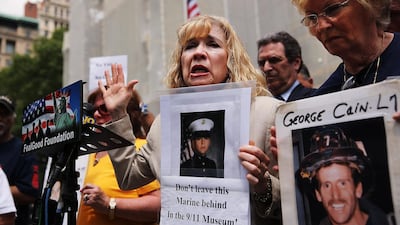My son turns 18 in November, which means that he wasn't quite a year old when planes flew into the World Trade Centre towers in New York on a perfect autumn day. Afterwards, many of us marvelled at the weather, as if somehow the sky should have anticipated the terror, as if there should have been swarms of locusts or swirls of hail to warn us of the ash and bone that were about to rain down.
On that day exactly 17 years ago today, I was at work in a suburb just outside the city, oblivious to what had happened until someone rushed in to say that the entire city had been sealed off. We watched on TV as the planes flew into the buildings, again and again, as if the repetition could somehow help us comprehend the enormity of what had happened.
At home, my baby son played with his blocks, building unsteady toddler towers that he delighted in knocking down; my husband watched from our window as what had been solid turned to smoke that hung in the sky for days afterwards.
Now that baby is applying to university. He knows about the attacks only from our stories and old news clips. He has had the luxury of an uninterrupted life. Others, of course, have not had that luxury. Thousands of lives were lost that day and those losses shattered multiple more thousands of lives, all over the world, as many people working in those buildings had come to the US to make better lives for themselves and their families.
In the United States today, ceremonies will be held to mark the anniversary of this loss of life, and this year I have the same question as I did last year: how will president Donald Trump manage that commemorative task, especially given that he's on the record as saying more than once that on the day of the attacks, there were thousands of Arabs watching and cheering as the towers came down – an utterly unfounded allegation but one that throws fuel on the smouldering flames of American Islamophobia.
Another legacy of the 9/11 attacks, in addition to heightened Islamophobia, is the continuing violence in Afghanistan, which last week claimed yet another victim in a 17-year war. Afghan reporter Samim Faramarz was killed by a bomb while he was reporting on an earlier, smaller attack.
He was 28; his cameraman, who was also killed, was only 23. Faramarz once said once that Afghanistan “lives in death”, an apt, if paradoxical, description for a country that has fighting for its sovereignty for 40 years.
This violence means that Faramarz will never turn 30; his cameraman will never be 24. It’s why boys the same age as my son go off to fight, on all sides of these battles, armed with whatever weapons their countries put into their hands.
They say there are no certainties in life and that we should be grateful for whatever length of time we are allowed to exist on the planet but don’t we all agree that the young should outlive the old? Isn’t it against the natural order for parents to outlive their children?
Through the sheer luck of being born where and when he was, my son, whose grandfather was born in Karachi, will start university next year (fate and test scores willing). I am excited to see where this next phase of his journey will take him.
Today in New York, Pennsylvania and Washington DC, the names of those who died in the attacks will be read aloud; parents will hear, again, the names of their lost children and imagine, as they must: “What if?” Where might their journeys have taken them?
What will not be read, on that day or any other, will be the names of the thousands who have died in Afghanistan due to US military operations. The parents of those who have died will mark their losses privately, endlessly.
Isn’t it time – again – to ask the question: what does all this death accomplish?
Deborah Williams is an associate professor of literature at NYU Abu Dhabi

